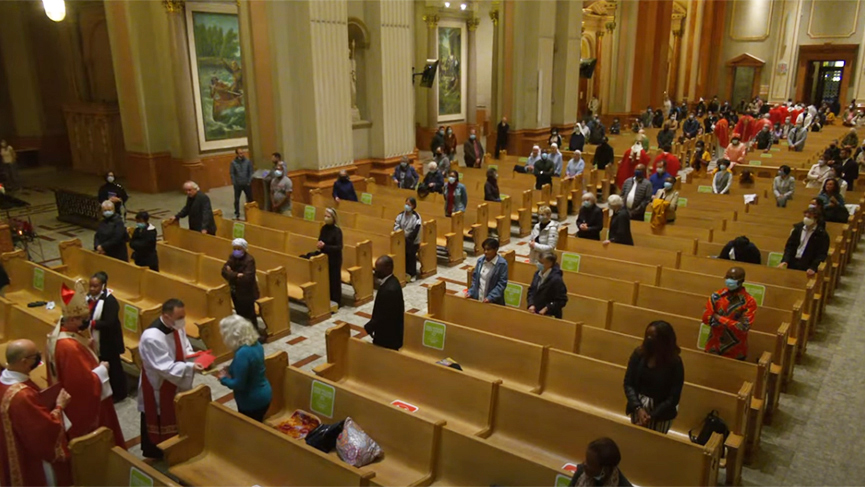Entering into the experience of the diocesan synod with the Holy Spirit!

Montreal
On October 17, a Votive Mass of the Holy Spirit was celebrated at Mary Queen of the World Cathedral to mark the beginning of the diocesan synodal experience as decreed by Pope Francis.
Being a missionary disciple in the world, as Pope Francis calls the Church to be, entails two dimensions, as Archbishop Christian Lépine explained during the Votive Mass of the Holy Spirit at which he presided on this occasion. There is first of all the personal dimension, whereby every baptized person is called to be a missionary disciple. But we are also called to become one together in the community dimension. For Archbishop Lépine, it is "not just a question of a sum total of individual efforts," but rather a question of constituting the "people of God as a oneness, as the body of Christ."
A hybrid synod for the diocese of Montreal
This synod, "is basically a review of our life." The Archbishop asked, "How are we as missionary disciples all together? How do we do this together?" He continued, "We already do some things together... Maybe we can do more!"
Continuing in this vein, he and Bishop Alain Faubert highlighted the logistics to be organized connecting this diocesan synod to the ‘roadwork’ project already under way throughout the diocese during the past several years. In order to make the process more tangible, Bishop Faubert recommended that we perform some "qualitative diagnostics on our "walking together," …"discerning the directions" to be taken in the future. While doing so, we must also at all times be listening for and welcoming the Holy Spirit’s counsel.
"In Jesus Christ, let us build a living Church that is open to evangelizing itself and undergoing improvement every day, a Church that is welcoming and that embraces humanity," Bishop Faubert urged, referring to the watchword of the diocesan roadwork project. That statement, together with the topics for reflection to be addressed during the synodal process, represent the essence of the "hybrid" approach which our diocese will be putting into action throughout the coming months.
Pope Francis’s three sequences
In his homily, the Archbishop unpacked the diocesan synod into three major sequences as laid out by the Holy Father. The first sequence "deals with the synodal Church" - that is - "a Church that walks together in the steps of Jesus Christ."
"His Holiness invites us to make our efforts more mindfully," continued Archbishop Lépine, "more deliberately and more thoughtfully." The importance of the community dimension and how to foster it is central to our reflections at the personal level, but also at the ecclesial and parish levels, as well as within the numerous movements and religious communities.
"How do we put Jesus Christ at the centre?" the Archbishop asks – most importantly, by seeking the guidance of the Holy Spirit! "Because reflection alone is not enough; studies are not enough. The intervention of God himself is needed."
The second sequence focuses on Jesus, the multitude and the apostles. If "our starting-point is always Jesus," in all things and for all things, and especially in being disciples, then the multitude "means everybody." More broadly even, "it also means non-believers, those whose beliefs or forms of devotion differ from ours."
"Jesus Christ came for all of humanity," for his disciples and for all others. "Being a disciple of Jesus Christ also requires us to reflect on how we can be together for all of humanity, how we can build bridges with others in our parishes and in our communities." The Archbishop cited the examples of non-profit associations and of the countless individuals whose works have made possible the connective links that bring together "all of humanity."
The third sequence concerns encountering, listening and discerning. "These three phases of disciple action go hand in hand with everything else," explained the Archbishop. "As regards the encounter, the model is Jesus Christ himself, who was present for all who wanted to encounter Him, going outside of himself in descending from Heaven to be among us.
"How can we too go outside of ourselves together? Wherever we encounter differences within the Church, yes; but also whenever we encounter others in their lives outside the Church." And this encounter involves listening that much more attentively, Archbishop Lépine reminds us, for this is when we truly learn to know the Other.

Comment
0 Comment
Add new comment